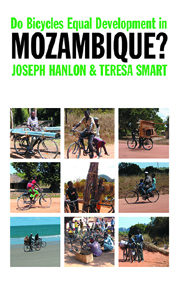Book contents
- Frontmatter
- Contents
- Acknowledgements
- The authors
- Money & measurements
- Abbreviations, acronyms & glossary
- Part I IS THERE DEVELOPMENT IN MOZAMBIQUE?
- 1 Introduction: more bicycles, but …
- 2 A brief history: war, peace & slow recovery
- 3 Can peasants pull Nampula out of poverty?
- 4 The Manica miracle is over
- 5 Cashew: from disaster to export model
- 6 Tobacco: hard choices
- 7 Has poverty decreased?
- 8 Is there development in Mozambique?
- Part II ACTORS & CONTEXT
- Part III ALTERNATIVES & THE DEVELOPMENTAL STATE
- Appendix 1 Aid
- Appendix 2 Investment & other tables
- Bibliography
- Index
2 - A brief history: war, peace & slow recovery
from Part I - IS THERE DEVELOPMENT IN MOZAMBIQUE?
Published online by Cambridge University Press: 05 April 2013
- Frontmatter
- Contents
- Acknowledgements
- The authors
- Money & measurements
- Abbreviations, acronyms & glossary
- Part I IS THERE DEVELOPMENT IN MOZAMBIQUE?
- 1 Introduction: more bicycles, but …
- 2 A brief history: war, peace & slow recovery
- 3 Can peasants pull Nampula out of poverty?
- 4 The Manica miracle is over
- 5 Cashew: from disaster to export model
- 6 Tobacco: hard choices
- 7 Has poverty decreased?
- 8 Is there development in Mozambique?
- Part II ACTORS & CONTEXT
- Part III ALTERNATIVES & THE DEVELOPMENTAL STATE
- Appendix 1 Aid
- Appendix 2 Investment & other tables
- Bibliography
- Index
Summary
In the 33 years since independence Mozambique has gone though a bewildering series of rapid changes, reflecting not only local events but those in southern Africa and the wider world. It has seen great hope and immense suffering. Too often, its fate has not been in its own hands. And outsiders still play an overwhelming and overweening role, as will be clear in this book. But Mozambicans have proved to be a remarkable people, adapting to the changes and building a nation against fearsome odds.
President Armando Guebuza fought in the decade-long liberation war which not only brought independence to Mozambique, but helped to overthrow the fascist dictatorship in Portugal. But only four other ministers fought in the liberation war – Tobias Dai (Defence), Feliciano Gundana (Veterans' Affairs), Isabel Nkavandeka (Parliamentary Affairs) and Cadmiel Muthemba (Fisheries). Much of the rest of the government are among the relatively few Mozambicans attending school at the time of independence. Most eventually took degrees from Universidade Eduardo Mondlane, often studying part-time or at night. Prime Minister Luisa Diogo, Finance Minister Manuel Chang and Interior Minister Jose Pacheco have undertaken advanced degrees through distance education from the University of London. Development and Planning Minister Aiuba Cuereneia was one of thousands of young people to do primary schooling in Cuba.
- Type
- Chapter
- Information
- Do Bicycles Equal Development in Mozambique? , pp. 6 - 15Publisher: Boydell & BrewerPrint publication year: 2008



